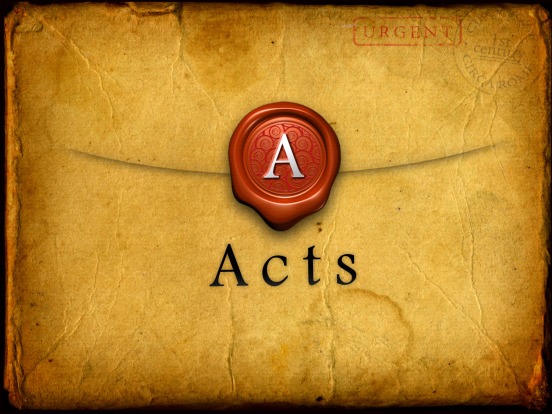If you are visiting this site for the first time, thank you. I am reading the New Testament in ninety days, and writing some of my thoughts here, every day, about what I read. This is day forty-one, and it is also the final day, and chapter, in the Acts of the Apostles.
It is also the day we find that Acts isn’t about any one person. It’s about the gospel.
Four Years
Paul survived a brutal shipwreck. On the island of Malta, his presence was a blessing to those who were sick. He healed them, and they honored him by funding the remaining part of the trip to Rome for the soldiers and the sailors.
He and his companions eventually made it to the Imperial City. While there, Paul lived alone for two years. Luke and Aristarchus, who made the trip with him, were not allowed to share a residence with him.
So, at the end of those two years, Paul had been involved in this episode, and been under arrest, for a total four years.
Four years.
The swiftly-moving and tirelessly-traveling Paul has now lost the mobility of Acts 13-19. He is now at the mercy of the authorities.
Because it doesn’t matter to God how the gospel gets to Rome. Just that it gets there.
It is inconsequential to God that Paul spend four years of his life under arrest. It may be an extreme trail for Paul (and Philippians indicates as such, even though he wrote often of joy, he was bothered at times about whether to even remain alive), but he was part of the globalizing mission of the gospel.
The ending of Acts, too, seems to be lacking for us who have followed Paul intently. Luke knew what happened after Paul’s two years in Rome, because he knew that Paul’s incarceration ended after those two years. But he doesn’t share that with us. He wants us to know two things.
Unstoppable Power
First, he wants us to know that Paul’s residence in Rome was only temporary. Whether he rented it, or whether it was furnished, makes no difference. Over and over again, the story of the gospel is a story of mobility. Even though Paul was grounded there for two years, it wasn’t permanent.
Second, the story of Acts is not the story of Paul. Or Peter. Or Philip. Or Stephen. It is the story of the gospel. It is a story without an end, and Luke won’t cheapen this book by giving us the illusion that it has stopped.
Because Luke has proven, through this writing, that the gospel cannot be stopped at all.
Not by religious zealots.
Not by murderous threats and actions.
Not by distance.
Not by time.
Not by prisons.
Not by skin color.
Not by idol-worshipers.
Not by shipwrecks.
Not by floggings.
Not by disease.
Not by death.
And certainly not by Rome.
The story of Acts begins with the coming kingdom of Jesus, and ends with the coming kingdom of Jesus. Everything between those two passages are parts played by people God allowed to share in the journey.
Which is both humbling and exciting. The gospel does not depend upon our talents, or our merits. Our place in the kingdom is a privilege that God allows us. We are honored, by God, to accept a place in its movement. Both our trials and our joys are testimonies to its power.
Acts of the Apostles proves that to us. And it proves to us how the message can transform betrayers and persecutors, Gentiles and Jews, Greeks in Athens, doctors in Troas, day laborers in Corinth, politicians on Cyprus, women in Philippi, men in Caesarea, and kids in Lystra.
This is the gospel we preach, and the God we serve. Don’t dilute this gospel down to rigid cultural stipulations, and don’t confine it to religious traditions among our fellowships. Please. It’s power is holy and amazing, and we rob it of that power when we attach anything to it at all. The grace and forgiveness of Jesus is what cleansed people flung across an Empire, not petty religious debates over practicality and opinions.
I pray we reclaim this gospel. We preach this gospel. We rejoice in this gospel. We minister this gospel. We share this gospel.
But however we use it, or abuse it, take caution dear reader. It cannot be stopped.

